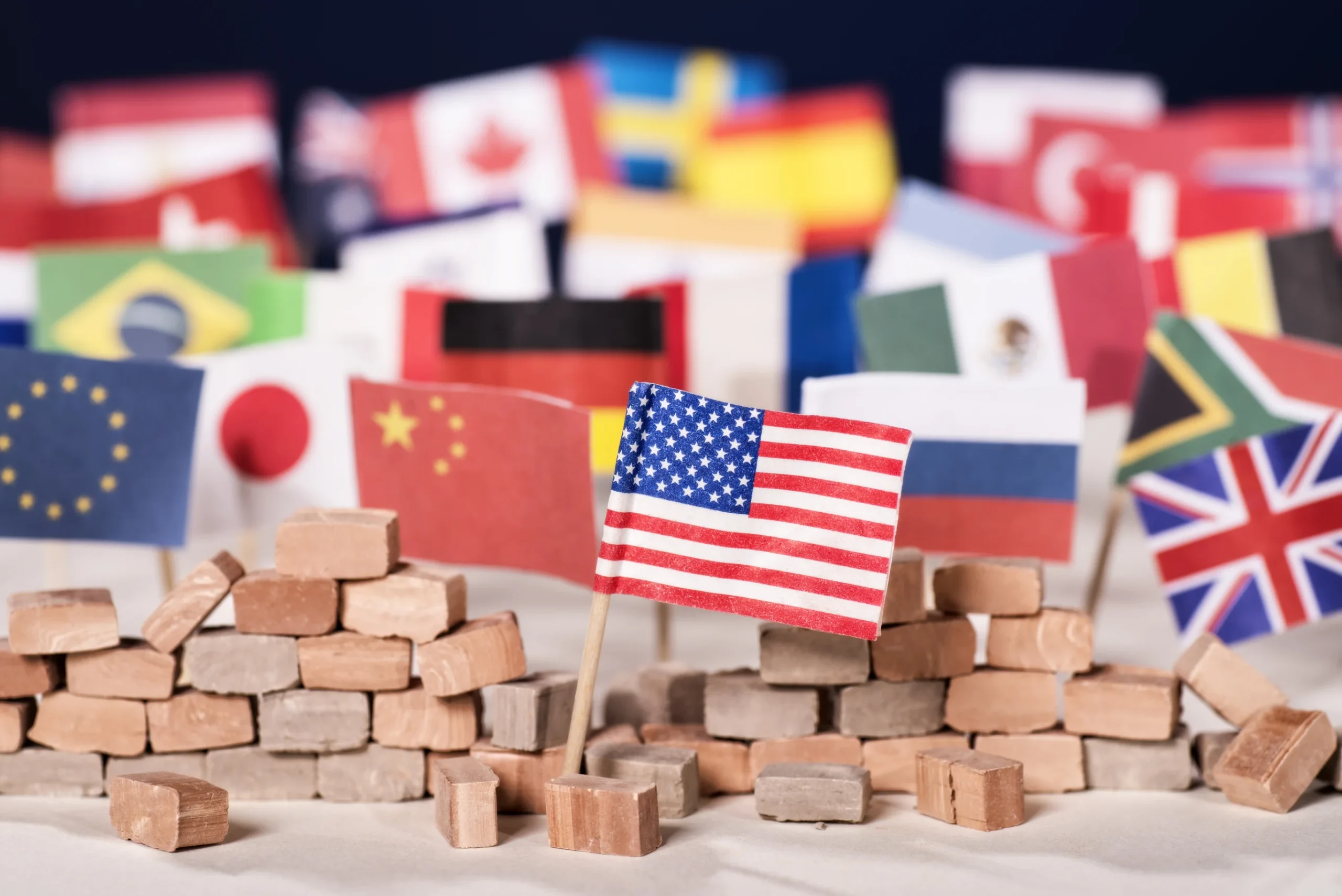George Washington’s Farewell Address:
“Europe has a set of primary interests, which have to us none, or very remote relation. Hence, she must be engaged in frequent controversies, the causes of which are essentially foreign to our concerns. Hence, therefore, it must be unwise in us to implicate ourselves, by artificial ties, in the ordinary vicissitudes of her politics, or the ordinary combinations and collusions of her friendships or enmities.
Why forego the advantages of so peculiar a situation? Why quit our own to stand upon foreign ground? Why, by interweaving our destiny with that of any part of Europe, entangle our peace and prosperity in the toils of European ambition, rival-ship, interest, humor, or caprice?”
Thomas Jefferson’s First Inaugural Address:
“I deem [one of] the essential principles of our government, and consequently [one] which ought to shape its administration, … peace, commerce, and honest friendship with all nations, entangling alliances with none.”
John Quincy Adams, 4 July 1821,Speech in Washington D.C.:
“America has abstained from interference in the concerns of others, even when the conflict has been for principles to which she clings…. She goes not abroad in search of monsters to destroy. She is the well-wisher to the freedom and independence of all. She is the champion and vindicator only of her own.”
James Monroe, Monroe Doctrine:
“We have never taken any part, nor does it comport with our policy so to do…. Our policy in regard to Europe…is, not to interfere in the internal concerns of any of its powers…”
NATIONAL SOVEREIGNTY
The United States is properly a free and sovereign republic which should strive to live in peace with all nations, without interfering in their internal affairs, and without permitting their interference in ours.
We are unalterably opposed to entangling alliances – via treaties, or any other form of commitment – which compromise our national sovereignty, or commit us to intervention in foreign wars.
We are opposed to the negotiation or ratification of any treaty, agreement, or partnership that would deprive United States citizens of their rights protected by the United States Constitution.
We are also opposed to any union whether political or economic, of the United States, Mexico, and Canada (NAU).
THE CONSTITUTION PARTY COMMITTMENT
We will do the following:
- Steadfastly oppose American participation in any form of world government organization, including any world court under United Nations auspices;
- Call upon the President, and Congress, to terminate United States membership in the United Nations, and its subsidiary organizations, and terminate U.S. participation in all so-called U.N. peace keeping operations;
- Bar the United Nations, and its subsidiaries, from further operation, including raising of funds, on United States territory; and
- Propose that the Constitution be obeyed to prohibit the United States government from entering any treaty, or other agreement, which makes any commitment of American military forces or tax money, compromises the sovereignty of the United States, or accomplishes a purpose properly the subject of domestic law.
- Denounce the agreement establishing the proposed Free Trade Area of the Americas (FTAA) and any other such trade agreements, either bilateral or regional in nature. All treaties must be subordinate to the Constitution, since the Constitution is the only instrument which empowers and limits the federal government.
- Require that American troops must serve only under American commanders, not those of the United Nations or foreign countries.
PACTS AND AGREEMENTS:
Since World War II, the United States has increasingly played the undesirable role of an international policeman.
Through our involvements abroad our country is being changed from a republic to a world empire in which our freedoms are being sacrificed on an altar of international involvement.
The United States is now committed by treaty to defend foreign nations in all parts of the world, and by agreements other than treaties to defend more.
We call upon the President, and Congress, to immediately commence a systematic withdrawal from these treaties and agreements, each of which holds the potential to plunge America into war in some far-flung corner of the earth. NATO, for instance, serves no defensive purpose for the United States, and this country should withdraw from it.
UNCONSTITUTIONAL, UNDECLARED WARS
Since World War II, the United States has been involved in tragic, unconstitutional, undeclared wars which cost our country the lives of many thousands of young Americans.
These wars were the direct and foreseeable result of the bi-partisan interventionist policy of both Democrat and Republican administrations.
The Constitution Party is opposed to the continuation of the same interventionist policy, with that policy’s capacity to involve our country in repeated wars.
We demand the following:
- That NEVER AGAIN shall United States troops be employed on any foreign field of battle without a declaration of war by Congress, as required by the United States Constitution;
- That Congress shall refuse to fund unconstitutional, undeclared wars pursuant to presidential whim or international obligations under which American sovereignty has been transferred to multinational agencies.
FOREIGN INVOLVEMENT
The Constitution Party has consistently opposed American involvement in conflicts in the Middle East, Africa, Asia, Europe, and Central and South America.
The United States has no interest in these areas which would justify the sacrifice of Americans on foreign battlefields – nor is our country properly cast as a merchant of death in international arms races.
We propose that the United States shall:
- Repudiate any commitment, express or implied, to send U.S. troops to participate in foreign conflicts, whether unilaterally, under NATO auspices, or as a part of the United Nations “peacekeeping” operations; and
- Cease financing or arming of belligerents in the world’s –troubled areas.
We support the principle of the Monroe Doctrine, which expresses U.S. opposition to European adventurism in the Western Hemisphere.
We call upon the Congress to immediately terminate American military presence in all foreign countries where such U.S. presence constitutes an invitation for this nation to become involved in, or further participate in, foreign wars.
FOREIGN AID
Since World War II, the United States has engaged in the greatest international giveaway program ever conceived by man and is now spending billions of dollars each year to aid foreign nations.
There is no constitutional basis for foreign aid. These expenditures have won us no friends and constitute a major drain on the resources of our taxpayers.
We demand that:
- No further funds be appropriated for any kind of foreign aid program;
- United States participation in international lending institutions such as the World Bank and the International Monetary Fund be ended;
- The Export-Import Bank be abolished;
- All government subsidies, tax preferences and investment guarantees to encourage U.S. businesses to invest in foreign lands be immediately terminated; and
- All debts owed to the United States by foreign countries, or foreign entities, be collected.

